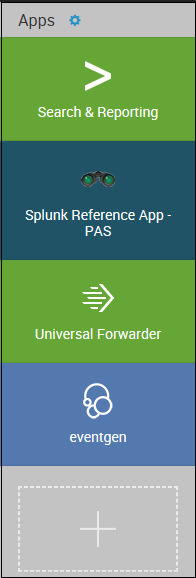The top bar in Splunk Cloud is relatively the same but shifts the locally installed Splunk right-located links (Messages, Settings, Activity, and Find) to the left:

While on the right, there is My Splunk:

The My Splunk link sends you to the Instances page, where you can view and edit information about the Splunk instances you have access to. You can also use this page as a portal to access all of your instances by clicking on the button labeled Access Instance next to the instance you which to log in to. This is the Instances page:

On the app list (left of the home app page) in Splunk Cloud, you will notice three apps preloaded for you: Splunk Reference App-PAS, Universal Forwarder, and eventgen (as follows):




